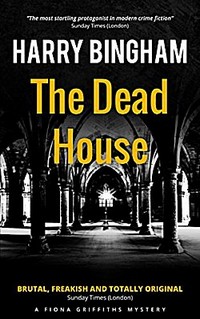 |
The Dead Houseby Harry Bingham Kindle Edition, 391 pg. Read: August 11-13, 2021 |

What’s The Dead House About?
The big task force that Fiona’s in, trying to get at the group she’s been on the heels of since book 1, is about to be shut down—they’re just not getting results. Predictably, Fiona isn’t dealing well with it. She needs something else to do to remind her why she’s with the police.
Circumstances too elaborate to get into lead her into being a detective on-scene near a small village to oversee a found body until the local police with jurisdiction can take over—but in the end, we have Fiona alone in a room with a corpse for a few hours. Naturally, she develops a strong emotional connection with the body and becomes determined to find out what happened to this woman.
There are no obvious signs of violence—and even some signs of care—to the woman, but she’s dead and she’s been left in a remote location without anyone notifying the authorities. And, it turns out, she’s been missing for quite a while.
Fiona needles her way into the investigation, of course (because what else is she going to)—and the path that she and the DI she’s assisting leads far beyond the small town they start in and to some truly dark places. (yeah, that’s incredibly vague, but I’m faced with being vague or giving you a few thousand words almost spoiling the story beats on this one)
So, what did I think about The Dead House?
Yes, over the last couple of books particularly, Fiona’s doing a good job on socializing, on connecting with people, on acting “normal” (a goal she longs for and yet doesn’t want at all). I love seeing that kind of development, as much as we like to see damaged protagonists struggling to cope—it’s always great to see them making healthier choices.
But at the same time…you put Fiona in a room alone with a corpse for too long so she develops a bond with the person she starts calling “Carlotta” (and resists using Carlotta’s actual name when she’s eventually identified)? I’m in. Fiona as the creepy detective who’s way too interested in dead bodies is just fun to read about.
Bingham doesn’t throw out all the progress she’s made, Fiona just sidesteps it for a little bit. Her natural tenacity and the people skills that she’s developing aid her in this investigation (and her self-destructive tendencies hinder her, too). It’s really the best of both worlds as far as Fiona’s character goes.
I wasn’t as taken with this story as I wanted to be—as I expected to be. And when the final whodunit reveal was made, I’d been waiting for it for longer than I should have been—not because I’m all that clever, but who else could it have been? That said, when the motivation and methods behind the reveal are made clear? That blew me away and creeped me out.
I can see how this is going to help the overall arc of the series, it had some great moments—and any time spent in Wales with Fiona is a reward. But I wanted a bit more from this one. Don’t start with this one if you’re interested in the series, but if you’ve read the rest, you’ll enjoy this one.

![]()



Read Irresponsibly, but please Comment Responsibly